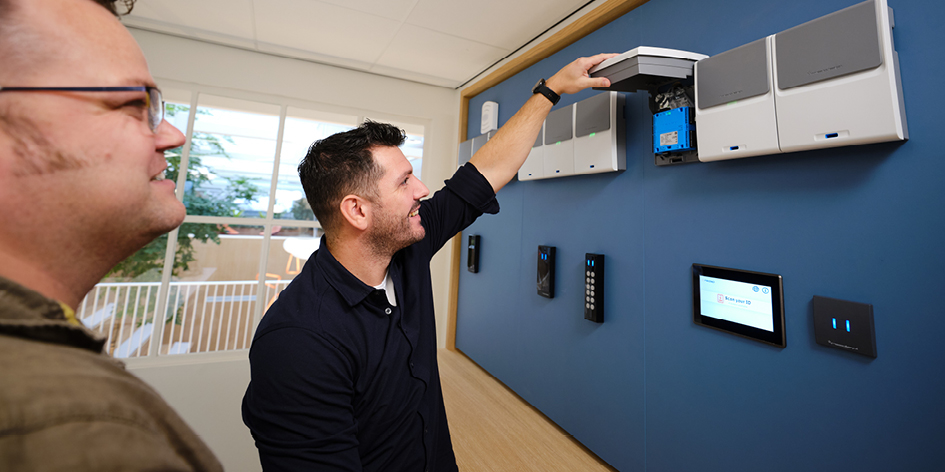3.3 Corporate Governance
Organisation
An agile organisation is crucial for effectively implementing our strategy and achieving our goals. The Nedap organisational structure aims to strike the right balance between market entrepreneurship and leveraging the knowledge and experience available within Nedap as a whole.
Board of Directors
Composition
The Board of Directors consists of three members: the CEO, the CFO and the CCO.
Details of the members of the Board of Directors

Mr R. M. Wegman
CEO
(1966)
Nationality:
Dutch
Working for Nedap since:
1 July 1997
First appointment to the Board of Directors:
21 May 2003*
Relevant additional positions:
None
Supervisory Board memberships:
Koninklijke Barenbrug B.V. (member)
* Titular director from 1 January 2002. Director under the articles of association since 21 May 2003.

Ms D. van der Sluijs
CFO
(1972)
Nationality:
Dutch
Working for Nedap since:
1 March 2020
First appointment to the Board of Directors:
25 June 2020*
Relevant additional positions:
None
Supervisory Board memberships:
Witteveen+Bos (member)
* Titular director from 1 March 2020 to 25 June 2020. Director under the articles of association since 25 June 2020.

Mr R. Schuurman
CCO
(1969)
Nationality:
Dutch
Working for Nedap since:
1 March 2004
First appointment to the Board of Directors:
12 April 2022*
Relevant additional positions:
None
Supervisory Board memberships:
None
* Titular director from 1 January 2022 to 12 April 2022. Director under the articles of association since 12 April 2022.
Responsibilities
The Board of Directors is responsible for governing the company and ensuring Nedap’s continuity. The Board of Directors has therefore developed a vision and strategy for long-term sustainable value creation that takes into account an acceptable risk profile, the impact the actions of the Nedap organisation have on people and the environment, and the interests of relevant stakeholders.

The Board of Directors is responsible for implementing this strategy and its results. In formulating the long-term sustainable value creation strategy, the Board of Directors liaises with the Supervisory Board, while also being accountable to shareholders. The Board of Directors is also responsible for compliance with applicable legislation and regulations and managing the risks involved in the company’s business activities by adequately structuring internal risk management and control systems. The Board of Directors renders account to the Supervisory Board regarding the effectiveness of the structuring and functioning of these risk management and control systems. Certain decisions by the Board of Directors require the Supervisory Board’s approval. Article 18 of the articles of association specifies what decisions are subject to Supervisory Board approval. To take discussions on Nedap-wide topics and decision-making preparations to a higher level and bolster support across the organisation for decisions by the Board of Directors, we set up an Alignment team in 2022. The Alignment team consists of the Board of Directors, the business unit leaders, the HR team captain and the General Counsel. It meets on a regular basis and acts as a sounding board for the Board of Directors.
Appointment
Directors are appointed by the Supervisory Board. The Supervisory Board notifies the general meeting of the proposed appointment. The Supervisory Board will not dismiss a director until the annual general meeting has been able to decide on the proposed dismissal.
Remuneration and employment/management terms
Each individual director’s remuneration and employment terms are set by the Supervisory Board in compliance with the company’s remuneration policy as adopted by the general meeting. The aim of this remuneration policy is to have a compensation package for the Board of Directors that is adequate for attracting and retaining qualified and expert directors, while also ensuring and advancing the medium and long-term interests of the company. More information about the remuneration policy is available at our Corporate Governance webpage. For more details on the implementation of the remuneration policy in the 2023 financial year, please refer to section 4.2 '2023 remuneration report'.
Supervisory Board
Composition
The Supervisory Board comprises five members. During the annual general meeting on 13 April 2023, Ms Pijnenborg was reappointed to the Supervisory Board for a four-year term. Mr Van Engelen was also reappointed to the Supervisory Board, but his term was set at two years. To ensure the ongoing continuity of the Supervisory Board, the Board decided to propose the appointment of a fifth member in anticipation of Mr Van Engelen’s departure in two years’ time. Mr Santema was subsequently appointed to the Supervisory Board for a four-year term. For more information about the members of the Supervisory Board and a skills matrix, we refer to section 4.1 'Report of the Supervisory Board'.
Given Nedap’s relatively low organisational complexity, no committees were established. In accordance with best practice provision 2.3.2 of the 2022 Dutch Corporate Governance Code, the full Supervisory Board has been appointed as the body authorised to perform the duties of the audit and other committees.
However, the Board is experiencing increasing regulatory pressure in various areas, which takes up much of the full Board’s time. The Board therefore decided in December 2023 to establish two committees, the Audit & Risk Committee, and the Remuneration Committee, as of 1 January 2024, to keep the execution of tasks, decision-making and meetings of the Board efficient and effective, with the right focus.
Responsibilities
The Supervisory Board reviews the governance of the Board of Directors and supervises general operations within Nedap N.V. and affiliated companies. The Supervisory Board also supports the Board of Directors in an advisory capacity. In fulfilling their duties, the members of the Supervisory Board are always guided by the interests of Nedap N.V. and the affiliated companies. The Supervisory Board also assesses the effectiveness of internal risk management and control systems and the integrity and quality of the financial reporting. The profile for the size and composition of the Supervisory Board can be found at the company website. Membership of the Nedap Supervisory Board conforms to the profile described and its members are independent of the company and of each other. The number of Supervisory Board memberships they hold at Dutch listed companies is within the limit on supervisory positions for Supervisory Board members.
Appointment
Supervisory Board members are appointed by the annual general meeting following a proposal by the Supervisory Board, as specified in the articles of association, generally for a period of four years. This proposal is made on the basis of a profile drawn up by the Supervisory Board. The annual general meeting and the works council may recommend candidates. The works council has an enhanced right of recommendation for a third of the Supervisory Board membership, as laid down in article 23.5 of the articles of association.
Remuneration
Remuneration of the individual members of the Supervisory Board is set by the annual general meeting in compliance with the company’s Supervisory Board remuneration policy as adopted by the annual general meeting.

Annual general meeting
The annual general meeting is held on an annual basis within six months of the end of the financial year. Items on the agenda for the annual general meeting include the annual report, adoption of the financial statements, the remuneration report, dividend payout, discharging the members of the Board of Directors and the Supervisory Board, any notices of proposed appointments of Board of Directors members and any appointments of Supervisory Board members. Key governance decisions that, by law and under the articles of association must be submitted to the annual general meeting, are also addressed, as are any other proposals submitted by the Supervisory Board or the Board of Directors. Shareholders representing at least 1% of the issued share capital may request in writing that an item of their choice be put on the agenda. Requests will be granted, i.e. the requested item will be put on the agenda, if the company has received the request no later than on the sixtieth day before the day of the annual general meeting.
Extraordinary shareholders’ meetings can be convened as often as deemed appropriate by a director or Supervisory Board member, if required by law, or if one or multiple shareholders who jointly represent at least 10% of the issued share capital submit a timely request to this effect to the Board of Directors and the Supervisory Board. Their request must include a detailed breakdown of the items they want to address. The convocation procedure for an extraordinary shareholders’ meeting is specified in article 31 of the articles of association.
Convocation of an annual general meeting
Annual general meetings are convened either by the Supervisory Board or by the Board of Directors, at least forty-two days ahead of the meeting date. The convocation notice will be posted on the company’s website as per the procedure laid down in article 46 of the articles of association.
Admission to annual and extraordinary general meetings and meeting rights
Nedap has only issued registered shares. Holders of one or multiple registered shares are authorised to attend the annual and extraordinary general meetings and to speak and vote at the meeting, provided that their entitlement to attend and vote dates back to at least twenty-eight days before the meeting date (the record date) and has been registered in a register designated by the Board of Directors, regardless of who the beneficiary of the shares is.
Shareholders wishing to attend the annual or an extraordinary general meeting are required to notify Nedap of their intention before a date set by Nedap’s Board of Directors through their bank or broker where their shares are held in trust, and by including proof of receipt, which serves as their entrance ticket to the meeting. This date cannot be earlier than seven days ahead of the meeting date.
Voting rights
Every share comes with the entitlement to one vote and there are no restrictions on voting rights.
Independent external auditor
The annual general meeting appoints the independent auditor following nomination by the Supervisory Board. The Supervisory Board oversees the performance of the external auditor. The performance of the external auditor is evaluated by the Supervisory Board on an annual basis.
Internal auditor
The Board of Directors both appoints and dismisses the internal auditor, after approval by the Supervisory Board. The performance of the internal auditor is evaluated by the Board of Directors on an annual basis, after consultation with the Supervisory Board. An independent third party will assess the performance of the internal auditor at least every five years.
Diversity, Equity and Inclusion
Our employees are the key to our long-term success. Nedap is fully aware that every employee is unique and that there are differences between individual employees. These can be differences in terms of gender, age and ethnic background, but there can also be differences in sexual orientation or religion. Nedap aims for an effective and transparent diversity policy. Diversity ensures that we are stronger together, get the best out of each other, and take different perspectives on problems and possibilities. Diversity contributes to innovation and balanced decision-making, enabling us to attract and retain talented people. Additionally, Nedap is committed to making sure that every single employee feels safe and heard. Nedap is home to an employee-initiated Diversity, Equity, Inclusion & Belonging Community that works to promote a positive and healthy work environment for all Nedap employees. Nedap adopted a DEI policy in 2023. The Board of Directors, the Supervisory Board and works council have discussed the DEI policy.
Our policy can be read on the website. Further information is also provided in section 2.3 'Progress on our sustainable impact'.
Gender diversity
The composition of the Board of Directors, Supervisory Board and senior management is subject to laws on gender diversity. Nedap has set targets for gender diversity in its two boards and senior management, which are detailed below.
Board of Directors and Supervisory Board
The Nedap Board of Directors is currently made up of three directors, two men and one woman. For the gender representation in the Board of Directors, we have set a target of 30% male and 30% female.
The Supervisory Board presently consists of five members, three men and two women. With this gender ratio, the Supervisory Board meets the legal requirement of one-third female and one-third male representation.
Given the current composition of the Board of Directors and the Supervisory Board, an ingrowth quota is not relevant.
Action plan
Whenever a vacancy arises on the Board of Directors or the Supervisory Board, Nedap aims to maintain a balanced composition, partly by compiling a longlist of candidates of whom 50% is male and 50% female. In case of a vacancy on the Board of Directors, Nedap does not set a specific requirement for the gender of the 3rd person on the board, aiming solely to preserve the 30% male and 30% female target. A candidate’s suitability for the position in question will be the decisive factor.
Policy implementation
As a result of the appointment of Mr Santema, reappointment of Ms Pijnenborg, and reappointment of Mr Van Engelen at the annual general meeting of 13 April 2023, the Supervisory Board will have five members. Given the composition of the five-member Supervisory Board, the ambition is to maintain the current balance of at least two men and two women. If the Supervisory Board and/or the Board of Directors is expanded at some point, the gender ratio target may be amended depending on the new size of the board.
Senior management
The Board of Directors has identified the positions at Nedap that are part of the company’s senior management. The holders of these positions are currently 82% male and 18% female.
Target/ingrowth quota
At the end of the financial year, 27% of the total workforce was female. Our target for Nedap’s senior management is to bring the gender ratio into line with that of the entire Nedap workforce as at year-end 2023. This means at least 27% of senior management should be female by 2025.
Action plan
Upward mobility among women must also be promoted. In 2023, we conducted an analysis to identify barriers for inclusion of female talent and explored ways to improve the hiring, promotion, and development of female talent within the organisation. When recruiting staff externally, our longlists will be at least 50% female. In our ultimate selection from the shortlist, we will actively favour a female candidate over a male candidate in case of equal suitability for the job in question.
Policy implementation
In mid-2022, we classified certain positions in the senior management echelon. Diversity was not a factor in this respect. In making changes to senior management, we will aim to adhere to the above target/ingrowth quota. During 2023, the classification of positions in senior management was modified due to our plans to reduce our Livestock Management Pigs and Staffing Solutions activities.
The Dutch Corporate Governance Code
The Supervisory Board and the Board of Directors are responsible for Nedap’s Corporate Governance, as well as for compliance with the 2022 Dutch Corporate Governance Code (Code). Please refer to https://www.mccg.nl/english (new window).
Deviations from the Dutch Corporate Governance Code
Principles and best practice provisions
Nedap largely endorses the Code’s basic and broadly supported principles. Several of the Code’s provisions require further explanation because Nedap applies them in a different way, for which we provide solid reasoning. In this report, we are rendering account on our compliance with this Code, which is based on the principle of ‘apply or explain’.
2.2.1 Terms of appointment and reappointment for directors
Given the nature of Nedap’s business, whereby the effects of strategic decisions generally take a long time to materialise, the Supervisory Board is of the opinion that a four-year mandate is too short. A decision was made therefore to appoint directors for an indefinite term. Nedap’s annual appraisal interviews also enable the Supervisory Board members to monitor the performance of the directors more effectively than if they were reappointed once every four years.
3.2.3 Director severance pay
For directors under the articles of association appointed before 1 January 2015, severance pay shall be determined partly by their length of service and partly in light of the permanent nature of their appointment. Directors under the articles of association appointed after 1 January 2015 are subject to the severance pay cap of one annual salary, which is the ‘fixed’ component of their pay.
3.4.2 Director contract
The key elements of a director’s contract with the company are published in a list on the company’s website after the contract has been signed, and in all cases no later than the notice convening the annual (or extraordinary) general meeting during which the appointment of the director will be proposed. When it comes to the provision for directors under the articles of association appointed after 1 January 2015, Nedap complies in the sense that members of the Board of Directors are appointed by the Supervisory Board after announcing the proposed decision to the annual general meeting.
4.1.3 Putting the dividend proposal on the agenda
Dividend payment is part of company strategy and long-term policy. Dividend proposals will therefore not be addressed as an agenda item, unless this payment is made partly or fully by drawing on the reserves. The dividend payment will, however, be explicitly included on the agenda as an item for discussion.
4.2.3 Meetings and presentations
Given the company’s scale and the limited international spread of Nedap’s shareholders, the availability of webcasting, smartphone and other facilities for live viewing of meetings and presentations is restricted. Presentations are posted on the company’s website immediately prior to the meeting at which they are given, so that all shareholders can read them.
4.3 Casting votes
Shareholders can vote by proxy or directly by following voting instructions. Given the limited scale of the company and relatively limited spread of outstanding Nedap shares, facilities for communication between shareholders are not yet provided.

Stichting Preferente Aandelen Nedap
Based on best practice provision 4.2.6 of the Code, the Board of Directors must provide a summary of all protective measures that have been taken or could be taken to protect the company against a third party from gaining control of the company.
Since 1973, Nedap has been able to issue preference shares as a protective measure. This protection can be deployed if a third party intends to gain control of the company by acquiring a decisive interest or otherwise attempts to adversely affect Nedap, without consideration for its business interests and those of all stakeholders.
Stichting Preferente Aandelen Nedap (the Foundation) was founded for this purpose in 1983. It looks after the interests of Nedap N.V., its business and all stakeholders, providing defence wherever possible against influences which could threaten continuity and conflict with its interests. Nedap has granted the Foundation the right to acquire preference shares, through a call option, under which, on request, the Foundation can acquire preference shares up to a maximum equal to the number of ordinary outstanding shares, less one, at the time the option is exercised. The call option obliges Nedap to issue the number of preference shares requested by the Foundation whenever it makes that request. Consequently, no further decision by any corporate body of Nedap is required; the decision was made when the option was granted to the Foundation. If preference shares are issued, the Foundation has to pay at least 25% of their nominal value in cash.
The board of the Foundation is made up of the following people:
Mr N. W. Hoek, chairman
Ms J. P. Bahlmann
Mr A. C. Metzelaar
Ms A. P. M. van der Veer-Vergeer
Mr R. P. Voogd
Mr G. van de Weerdhof
The composition of the board is intended to ensure that the interests of all Nedap stakeholders are looked after in the decision-making process to the maximum degree. According to both the directors of this Foundation and those of Nedap, the Foundation is independent from Nedap, as specified in Article 5:71(1)(c) of the Dutch Financial Supervision Act (Wet op het Financieel Toezicht). Preference shares take precedence over ordinary shares when it comes to dividend payment or pay-out of capital paid up on shares, the latter in the event of Nedap’s liquidation.
Other
Material transactions
To the best of Nedap’s knowledge, there are no:
material transactions between legal or natural persons who hold at least 10% of the shares in Nedap as meant by provision 2.7.5 of the Code;
material transactions of the company with a related party that are outside the framework of normal operations or not in line with normal market conditions (Article 2:167 Dutch Civil Code); and
restrictive agreements with shareholders.
To the best of Nedap’s knowledge, its shareholders are not a party to an agreement that could lead to restrictions on trading in Nedap shares or on voting rights.
Change of control
The standby roll-over credit agreement (€14 million) that Nedap has entered into with its bank includes a provision under which the bank can demand early repayment of the loan if there is a significant change in control over Nedap’s activities. It is not unusual for other long-term alliances in which Nedap is a party to also include the possibility of terminating the agreement with immediate effect in the event of a change of control. A change of control, however, is not expected to have a significant impact on Nedap’s financial performance. Nedap has not entered into agreements with directors or other employees under which personal rights to compensation can be derived upon termination of their employment after the settlement of a take-over bid for Nedap shares.
Issue of shares in the company
As per the articles of association, the Board of Directors is only authorised to issue shares if the annual general meeting designates it as the body authorised to issue shares. The annual general meeting of 13 April 2023 designated the Board of Directors as the body authorised to issue ordinary shares in the capital of Nedap and to grant rights to subscribe to shares in Nedap’s capital. The Board of Directors’ authority to issue shares is limited to a maximum of 10% of the total issued share capital at the time of issue. This requested designation has been granted for a period of 18 months. A resolution by the annual general meeting to issue shares or to designate the Board of Directors as the body authorised to issue shares, or the withdrawal of a resolution to designate, can only be passed on a proposal of the Board of Directors with the prior approval of the Supervisory Board. A resolution to issue shares by the Board of Directors, provided that the Board of Directors has been designated as the body authorised to issue shares, is always subject to Supervisory Board approval in each specific case. Preferential rights can be limited or excluded by the body appointed to decide on share issues. The shareholders’ decision to adopt the proposal to designate the Board of Directors has been published on our website. (new window)
Share buybacks
Nedap may only acquire its own fully paid-up shares for no consideration. Acquisition other than for no consideration is only possible if:
shareholders’ equity less the purchase price is not less than the paid up and called up part of the capital plus the reserves that must be maintained by law and/or under the articles of association;
the nominal amount of the company’s own shares is no more than 50% of the issued share capital;
the annual general meeting has appropriately authorised the Board of Directors. This authorisation is not required to acquire the company’s own shares or depository receipts in order to transfer them to employees under an applicable plan.
In accordance with article 13 of the company’s articles of association and without prejudice to the provisions of Article 2:98 of the Dutch Civil Code, the annual general meeting of 13 April 2023 authorised the Board of Directors to acquire ordinary shares up to a maximum of 10% of the total issued share capital of Nedap N.V. After such an acquisition, Nedap N.V. or one or several of its subsidiaries, can never hold more than 10% of the total issued share capital of ordinary shares in Nedap N.V. for their own account. The ordinary shares can be acquired through purchase on the stock market or otherwise at a price that lies between the nominal value of the ordinary shares and 110% of the average closing price of the ordinary shares on the Euronext Amsterdam N.V. stock exchange over the five consecutive trading days prior to the day of purchase.
The requested authorisation will be valid for a period of 18 months from 13 April 2023. The decision by the shareholders has been published on our webpage.
Amendment of the articles of association
Nedap’s articles of association may be amended by a resolution of the annual general meeting after approval by the Board of Directors and Supervisory Board.
Corporate Governance statement
The Corporate Governance Statement specified in the 'Decree on the content of the Directors’ Report' is part of this Directors’ Report: The information required can be found in chapter 3 'Risk & Governance: how we safeguard value'. Additionally, more information regarding Diversity, Equity and Inclusion can be found in section 3.3 'Corporate Governance' and section 2.2. 'People, culture and leadership'. The Directors’ Report also includes information required under the Decree ratifying article 10 of the Takeover Directive to the extent that it applies to Nedap N.V.
Consolidated non-financial statement
In compliance with Article 2 in conjunction with Article 3 of the Decree on Disclosure of Non-Financial Information, the following information is provided and explained as part of the report of the Board of Directors.
Nedap produces high-quality, innovative solutions that are intended to create sustainable value for customers, the planet and Nedap itself. For more information about our business model, reference is made to our value creation model (section 1.3).
We firmly believe in the importance of adopting a responsible approach to risks in the areas of the environment, social and staff affairs, human rights, and anti-bribery and corruption.
For a detailed explanation of our approach to risks in these areas, please refer to the Risk table in section 3.2 'Risk management'.
|
Area |
Policy/goals |
Main risks1 |
Activities/mitigating measures |
Reference |
|
Environment |
Our own operations are where we can exert the greatest influence. We aim to minimise, and where possible, eliminate our operations’ negative environmental impact. |
Inability to achieve environmental sustainability goals. |
The assessment of double materiality helps to clarify our exposure, from both a risk and an opportunity perspective. |
2.3 Progress on our sustainable impact |
|
Ambition: Scope 1 and 2 carbon emissions to net zero by 2030. |
Nedap has a roadmap with several key targets, including maximum use of renewable energy, sustainable building management and a fleet of sustainable vehicles. |
2.3 Our impact: operations |
||
|
Given the fact that what happens beyond our own operations has a greater sustainability impact, we work to reduce carbon emissions across the entire supply chain. |
Inability to achieve environmental sustainability goals. Non-compliance could lead to reputational damage. |
Through various life cycle analyses (LCAs), the impact across production, transportation, disposal, and the use phase of our products has been identified. Key finding: reducing the power consumption of our products will have a major impact. |
2.3 Our impact: products |
|
|
Ambition: Nedap aims to lower the carbon impact of its products and solutions |
Achieving our sustainability goals will require cooperation with business partners, suppliers and customers. Next steps: to analyse the impact of our entire hardware product portfolio in detail, create a plan and set specific carbon reduction targets. These are now being worked on within the key markets. In 2024 a concrete target will be set for the company as a whole. See 2.2.3 for more steps. |
|||
|
Production facilities are ISO 9001 and ISO 14001 certified. In selecting our suppliers, we place a strong emphasis on sustainability criteria. Only suppliers that meet our requirements will qualify as supplier. Audits are being held. Proactively managing risks associated with chemicals and hazardous substances, ensuring compliance with REACH and RoHS standards. Responsible material sourcing, ensuring our products are free from conflict minerals. Identifying products and services that may contain these minerals and conducting due diligence processes. |
3.1 Business integrity |
|||
|
The greatest but also most indirect impact comes from the use of our propositions. We strive to help make our customers’ business models sustainable through our propositions. |
2.3 Our impact: customers |
|||
|
Target: to embed sustainability in our propositions so that they help to make our customers’ business models more sustainable. |
To integrate sustainability into the strategic ambitions of our propositions. When developing new propositions, their contribution to sustainability is an important consideration. |
|||
|
Social and staff affairs |
Given the importance of our employees, they have been designated one of the four focus areas where our sustainability ambitions can make an impact. At Nedap, developing and making the most of talent comes first. We facilitate a safe and inspiring working environment where development and deployment are encouraged. |
Shortage of talented employees leading to a delay in the implementation of the strategy. Undesirable departure of (dissatisfied) employees. |
We have set a target for all employees to spend at least 40 working hours a year on their personal development. In 2023, this target was achieved by 52% of 571 respondents (47% of 386 respondents in 2022). |
2.3 Our impact: employees |
|
Target: 40 hours of development per employee per year. |
||||
|
We aim for a Nedap-relevant composition that reflects the society around us. We also want to ensure that everyone feels safe and heard. |
Nedap has an open, employee-founded platform to discuss issues related to Diversity, Equity and Inclusion. In 2023, we defined our Diversity, Equity and Inclusion policy based on extensive interviews and discussions with a diverse group of employees. In 2023, we held in-depth interviews to assess how Nedap can facilitate and support the development of female leadership. |
2.3 Our impact: employees |
||
|
Target: 27% female representation in our senior management by 2025. |
||||
|
At Nedap, the health and safety of our people is a top priority. |
To ensure employees' health and safety: |
2.3 Our impact: employees; 3.1 Business integrity; 2.2 People, culture and leadership |
||
|
In our pursuit of building enduring, sustainable relationships with our employees, we ensure that their fundamental rights are respected. |
We ensure that fair wages and benefits are provided. The right to freedom of association and collective bargaining is a fundamental and non-negotiable principle that we fully respect. The principle of free choice of employment is upheld for every employee across all the countries in which we operate. |
3.1 Business integrity; 2.2 Progress on people, culture and leadership, Code of conduct |
||
|
We have learned that the added value per employee is determined by the combination of the quality of employees, a culture that enables employees to excel, and our own perspective on leadership. Growth in added value per employee serves as a crucial indicator of the evaluation of our competitive advantage. |
Shortage of talented employees leading to a delay in the implementation of the strategy. |
We actively enhance our appeal to talented individuals and have a recruitment process that identifies those who are a good fit with Nedap. We significantly invest in the ongoing development of current Nedap employees through training, education, and development programmes. We give continuous attention to leadership and leadership development, a strategic priority within the Step Up! strategy. Various training and development programmes are available. |
1.5 People, culture and leadership |
|
|
Human rights |
We are committed to preventing human rights violations and conduct our business operations with a strong emphasis on fairness, honesty and integrity, as outlined in our code of conduct. We expect the same from all of those we work with. |
Violation of human rights can lead to harm to individuals and to reputational damage. |
Human rights form part of supplier assessments and audit procedures. Any investigations, based on the OECD guidelines, are conducted in a way that matches Nedap’s size and the nature and context of its operations, as well as the seriousness of the risks of adverse effects on human rights. It is important to us that organisations in our supply chain hold our core values and principles in high regard and operate accordingly. In 2023, we received no reports or evidence of human rights violations or abuses. Human rights form part of supplier assessments and audit procedures. |
3.1 Business integrity |
|
Given our risk profile, we do not have any generic indicators in this area. |
||||
|
Anti-bribery and corruption |
We maintain a zero-tolerance policy regarding bribery and corruption. We recognise that every material transaction requires the involvement of multiple individuals. Whenever theres a suspicion of bribery or corruption, we take action, guided by individual observations and a thorough investigation. |
Bribery and corruption can lead to reputational damage and substantial penalties. |
Nedap has an anti-bribery & corruption policy in place that sets out the guiding principles and do's and don'ts in this field. In addition: |
3.1 Business integrity; 3.2 Risk management |
The information included in section 6.3 'EU Taxonomy' is part of this statement. This reference is intended as a way to comply with the reporting obligation under article 8 of the Taxonomy Regulation. One of the consequences of the aforementioned section is that activity 8.1 (Data processing, hosting, and related activities) at Nedap is a Taxonomy-eligible revenue-generating economic activity. This activity can be designated as aligned (environmentally sustainable) in the sense of article 8 of the Taxonomy Regulation. The same goes for a number of individually eligible (CapEx) activities, such as a recent renovation of (part of) our premises. For these activities, we comply with the criteria and minimum safeguards for alignment set by the Taxonomy Regulation, including acting in compliance with OECD guidelines for multinational enterprises and the United Nations’ guiding principles on business and human rights. This also goes for the principles and rights laid down in the conventions referenced in the International Labour Organization’s declaration on fundamental principles and rights at work and in the International Bill of Rights.

The current financial year introduced a notable expansion in the Taxonomy’s scope, encompassing the remaining four environmental objectives mentioned in section 6.3. Environmental objectives are currently targeted at activities relating to water leakage control, waste treatment, pharmaceutical products, nature conservation & restoration and sustainable manufacturing (and related services). Only the last category encompasses economic activities that Nedap performs. Of these activities the manufacture of electrical and electronic equipment qualifies as most relevant.
Directors’ statement
In line with best practice provision 1.4.3 of the Code, the Board of Directors states to the best of its knowledge that:
the Directors’ Report (the complete annual report without chapter 5 'Financial statements') as included in this report offers an adequate level of insight into the shortcomings in the operation of Nedap’s internal risk management and control systems;
the aforementioned systems provide reasonable assurance that Nedap’s financial reporting is free from material misstatement;
the report reflects the status of Nedap’s current operations and the fact that financial reporting has been prepared on a going concern basis; and
the Directors’ Report contains material risks and uncertainties that are relevant in the formulation of expectations as to Nedap’s continuity.
Despite the internal risk management and control systems, material errors, fraud and unlawful actions can still take place. The systems therefore do not provide absolute assurance that targets will be achieved. They have been developed to obtain reasonable assurance as to the effectiveness of controls implemented to mitigate the financial and operational risks related to organisational objectives.
In addition, the Board of Directors states, in compliance with Article 5:25(c) of the Dutch Financial Supervision Act and to the best of its knowledge, that:
the financial statements provide a faithful representation of the assets, liabilities, financial position, and profit/loss of the issuing entity and the companies included in the consolidation; and
the Directors’ Report provides a faithful representation of the position of the company and consolidated businesses at 31 December 2023 and of Nedap’s development and performance during the 2023 financial year and describes the significant risks the company is facing.
Groenlo, the Netherlands, 21 February 2024
Board of Directors
Mr R. M. Wegman, CEO
Ms D. van der Sluijs, CFO
Mr R. Schuurman, CCO